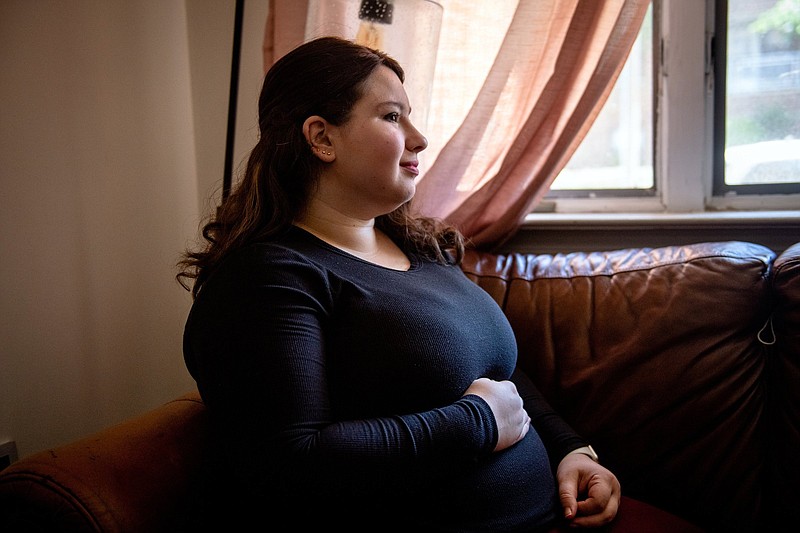NEW YORK -- In April, rumors began swirling in various New York neighborhoods with large Orthodox Jewish communities about how the coronavirus vaccine could pose a serious threat to women's fertility.
On WhatsApp groups, recordings of rabbis warning against what they said were the vaccine's adverse effects proliferated quickly among the growing networks for the mothers of teenage girls who do not want their daughters vaccinated.
Miriam Tewel, an 18-year-old from the Crown Heights neighborhood of Brooklyn, said the rumors influenced her decision not to go to Israel for a one-year stay at a seminary in Jerusalem because it required a vaccination.
"Anything that could compromise my future as a mother is not worth the risk," said Tewel, 18, who is the youngest of 11 children.
[CORONAVIRUS: Click here for our complete coverage » arkansasonline.com/coronavirus]
Many of Tewel's friends are consulting about the decision with their rabbis, who have a large say in what happens in the community and have been making recommendations on a case-by-case basis. But Tewel has already made up her mind.
There is no evidence that any vaccines, including coronavirus vaccines, cause fertility problems, and women do not need to avoid becoming pregnant after receiving a coronavirus vaccine, according to the Centers for Disease Control and Prevention.
Many prominent mainstream Orthodox leaders in the New York region and in Israel, where the virus has all but disappeared, have advised their communities to get the coronavirus vaccine.
But in ultra-Orthodox circles in New York, where women marry at a younger age and birthrates dwarf those of the general population, the spread of unsubstantiated rumors about the coronavirus vaccine's potential adverse effects on fertility and pregnancy have been particularly effective in dissuading young women from getting the vaccine, interviews with health officials and community members show. These neighborhoods have some of the lowest vaccination rates in New York.
Misinformation campaigns in these communities during the pandemic led to a resistance to restrictions and guidelines that at times caused a surge of virus cases.
A concern for officials is that a resistance to the vaccine in Orthodox neighborhoods could play a part in endangering the city's long-term prospects for a health and economic recovery.
While vaccine hesitancy has been seen in many Hispanic and Black neighborhoods in the city, the resistance in ultra-Orthodox neighborhoods may be more difficult to combat because of the insular nature of the community, according to community activists and health department officials.
"Fears about the vaccine and fertility have caught on in the Orthodox community like wildfire," said Dr. Bat-Sheva Lerner Maslow, a reproductive endocrinologist and founding board member of Jewish Orthodox Women's Medical Association, a grassroots group that has taken the lead on combating misinformation about the coronavirus vaccine circulating in Orthodox circles.
CONFLICTING MESSAGING
New York will spend as much as $60 million, according to one estimate by health officials, on a vaccine outreach program to combat hesitancy and access concerns. But in many Orthodox neighborhoods messages from respected rabbis resonate more.
In Israel, where coronavirus restrictions have ceased now that the majority of the population has been vaccinated, state officials confronted similar difficulties with the ultra-Orthodox community. However, representatives from within the community waged an effective counter-messaging campaign.
But those messages have not been as successful in New York.
In the ZIP code for Borough Park in Brooklyn, which has a large Orthodox community, 28.5% of the population is fully vaccinated, compared with a 45.7% rate for all city residents. In the ZIP code for South Williamsburg, where several leading Hasidic sects are centered, 35% of the population is fully vaccinated. In East Crown Heights, where the Chabad-Lubavitch Hasidic sect is headquartered, that number is 30.5%.
Patrick Gallahue, a spokesman for the city's Department of Health, said the agency has been running ads in local Orthodox media, been working with community-based organizations to host additional pop-up vaccination sites and has partnered with trusted organizations like Hatzalah, an Orthodox volunteer-run ambulance corps, to educate community members.
Other organizations in the region have made similar efforts.
VACCINE EDUCATION
In April, the Jewish Orthodox Women's Medical Association hosted three livestream webinars about the coronavirus vaccine aimed at Orthodox women, doulas, premarital counselors and ritual bath house or mikvah attendants, engaging nearly 5,000 participants.
Rabbi Michoel Green, a Hasidic rabbi based in Massachusetts who was disowned from his movement in February for a series of aggressive social media posts railing against pandemic-related lockdowns and mask mandates, recorded a number of widely distributed robocalls warning ultra-Orthodox community members against receiving the coronavirus vaccine.
Green's twin brother, Rabbi Daniel Green, a Hasidic rabbi who lives in Crown Heights, directs efforts to resist the vaccine in New York. He recently stepped down from his teaching position at a local seminary for post-high school Hasidic women because the school hosted a clinic to administer the coronavirus vaccine earlier this month.
The Green brothers believe that Jewish law forbids someone to expose himself or herself to an "experimental" vaccine, with those of childbearing age poised to lose the most.
The messages appear to have been at least somewhat effective.
Miriam Schwarzschild, a Brooklyn-based midwife who works with the ultra-Orthodox community, said several of her clients had been upset that she had gotten vaccinated.
"Many of them felt betrayed," she said. "It's taken me many years to build up trust within this community, and I think my choice to get the vaccine set me back. For many, the vaccine is a bridge too far."

